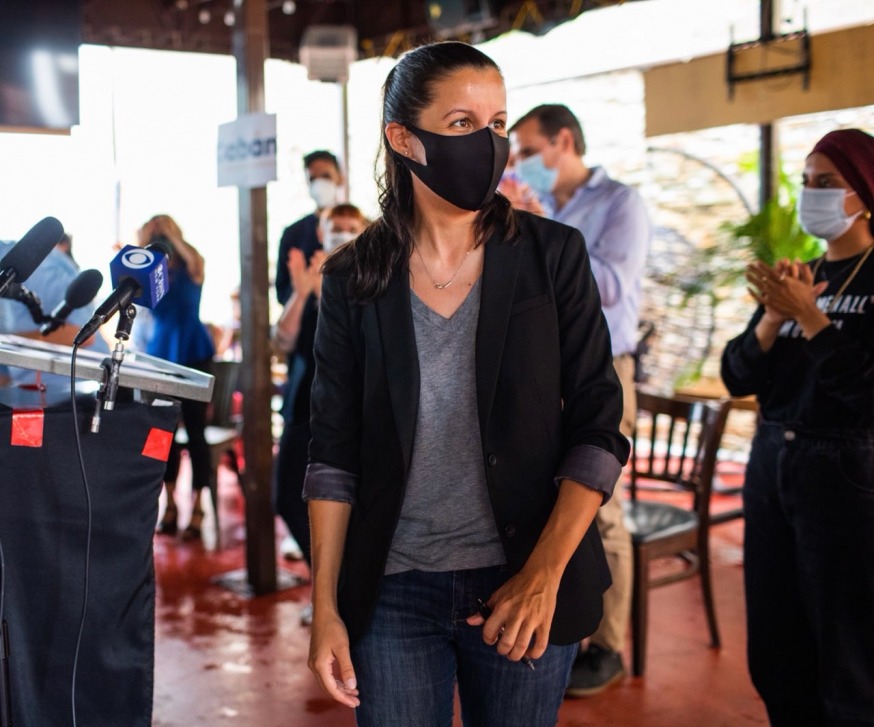
Tiffany Caban (Photo: CabanForQueens)
Feb. 6, 2021 By: Tiffany Cabán
New York City is facing an unconscionable health crisis.
Twenty hospitals have closed over the last decade, most of them safety net institutions here in Queens that serve the un- or underinsured. Meanwhile, the City spends $12 billion more on incarceration and policing, than it does on care and supportive services.
But numbers cannot even begin to convey the devastating degree to which our health system fails us. That three by six-foot hospital mattress that is needed and managed and visited by so many people over a single day, becomes something much bigger: it captures all matters public and private, of dignity and disgrace, for this generation and the next.
Right now, thousands of people are left on their own to deal with the COVID-19 pandemic and the economic disaster it has caused. If you have a bad back and your kitchen light goes out – tough. If you fall while trying to replace the bulb, and you’re un- or underinsured – tough.
This tough-on-care mindset is the same one that pervades thinking across our government. It leaves people suffering and isolated. It causes a collective hopelessness and despair.
We need a proactive healthcare approach that aims to meet the needs of everyone – from the chronically ill to the healthiest individuals. The reactive approach we currently rely on in healthcare has led to inequities in all of our institutions.
This system has driven mass incarceration and disproportionately impacted Black and brown communities. Those disparities were abundantly clear when COVID-19 hit New York City. At a time when a pandemic has exacerbated every existing social inequity, it’s time for a paradigm shift.
We have to remember: What happens to one of us happens to all of us. Where you live shouldn’t determine whether you live.
In this unprecedented moment, we must make an unprecedented movement toward justice.
As we roll out vaccines as rapidly as possible, we must also take specific steps to build a more resilient city. That means taking steps to both build out the number of hospitals and beds that we have, while also setting up neighborhood-level comprehensive healthcare services, which include mental healthcare and peer support.
We need to create more capacity and to build infrastructure to adopt a proactive healthcare approach.
We need community safety centers with local clinics that include healthcare responders, de-escalation experts, peer support, holistic services, civilian crisis teams and trained door-to-door support providers hired from local communities, all backed by universal health insurance coverage.
We need integrated service facilities in every neighborhood that offer communities quality and accessible care including substance use treatment and overdose prevention programs as well as comprehensive legal support, including when healthcare issues arise.
We need a vaccine program that reaches the places most impacted by COVID-19. Vaccines only work if they can reach people and if people agree to get them. Rapid vaccination programs staffed by people from our communities with full accessibility and language justice that identifies and proactively reaches out to every person living in our city in order to maximize our vaccinated population is essential to creating public awareness and demand.
The rollout of COVID-19 vaccines and therapeutics should strengthen the broader healthcare system – not strain it. Community networks need to be prepared to fully administer and utilize COVID-19 vaccines, therapeutics and other essential tools to stop the spread of this virus.
We can do this. We can take those steps. We can build those systems.
A community leader at Astoria Houses recently told me, “We say it takes a village to raise a child – but who is taking care of and uplifting the village?” That is the role of government in our society, and it’s time for our government to step up and take care of our village, so we can take care of our people.
A care-based economy would fully fund good-paying union jobs for people from communities to take care of each other. It would mean people could be paid to go door-to-door to address daily healthcare-related needs, from chores that are physically harder for some people based on circumstances, to preventative routines like healthy food provision and wellness checks.
This isn’t a wishful framework. This is based on what is working already, and can be a reality right here.
It would mean that everyone has access to the healthcare they need – including mental health. These essential services should no longer be a privilege or a luxury.
It would mean a more resilient healthcare system, more capable of meeting the systemic shocks that this century might bring, and more prepared to prevent harm.
It would mean an economy rooted in caring for one another, where success is conditioned in the opportunity, stability and well-being of the most vulnerable among us.
It would mean we, the people, getting the system we deserve.
4 Comments

Who?
So are there any concrete recommendations here, or just lots of expensive “should”s?
Who’s going to pay for all this?
Agree w her re the need for mental healthcare and peer support but the rest of this seems less focused on how to accomplish goals and more like a pep talk. Would like to hear more about actual ideas vs. speaking on how things should be.